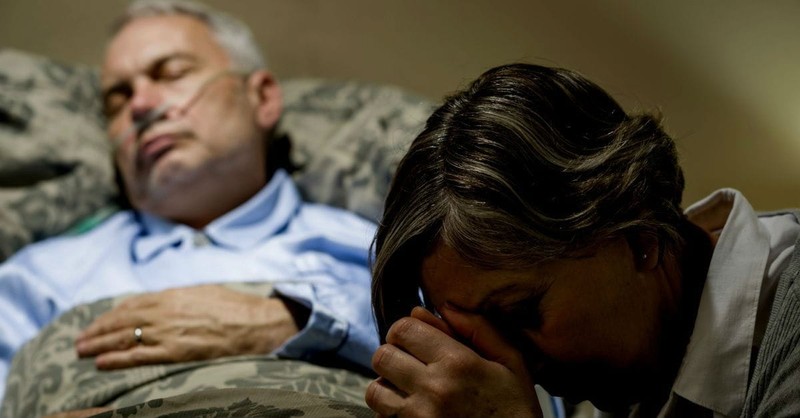
The influence of sin in the world means there is pain, suffering, hatred, and death. It also means there are illnesses which ravage our bodies and disrupt our lives. Some diseases are more wide-reaching than others. During times of difficulty and stress, including during personal illness, many turn to the Bible for answers and strength. But sometimes, this research can lead someone down a confusing path of theories and speculations.
There are those who put medical professional opinions over the Word of God, and some who refuse to see a doctor because they believe that God will heal them through miraculous intervention. Others will panic because a website diagnosed them with cancer, while others more will brazenly ignore sound advice about their health.
So what does the Bible actually say about health, illness, and medicine?
Photo credit: ©Getty Images/Dragana991

1. Don't Ignore Your Symptoms
Much of the writings of the Apostle Paul that made it into the canonized Bible are epistles – letters to specific churches or individuals. Not only are they filled with theology and advice on Christian-living, they have personal touches. He acknowledges individuals, or details that give insight into their lives. One such moment comes in 1 Timothy.
While writing to Timothy, Paul mentions “No longer drink only water, but use a little wine for the sake of your stomach and your frequent ailments” (1 Timothy 5:23). Paul understood that Timothy was prone to bouts of illness, it seems particularly with his stomach, so he compels the young minister to do something to fix it. He does not tell him to ignore it, or pray that God will just make his stomach better. He encourages him to take active measures to alleviate his symptoms.
Another important point, the water in Ephesus where Timothy was pastoring new believers, was notoriously dirty and bad to drink. Paul recommends that his young friend stop drinking just that water for very practical reasons. At that time, it was not just Ephesus that had a dirty water problem. It was good hygiene and health practices to drink less of the river water, and add a mildly alcoholic beverage to one’s diet. Paul’s words are a good reminder that there is wisdom in not doing something that can create health risks.
Photo credit: ©Getty Images/Seb_ra

2. Good Hygiene Is Important
Before Jesus Christ died and rose again as the substitute for the sins of the world, those who wanted a good relationship with God l had to follow the law. This included the Mosaic law, including the ten commandments, the sacrifices and feasts, as well as cleaning rituals.
Among other things, these rituals were a part of being spiritually clean before God through outward compliance. Some of them were also very good hygiene advice, tips that are recognized as such today. If a disease or mold had been in a house, the book of Leviticus says, “ And he shall examine the disease. And if the disease is in the walls of the house with greenish or reddish spots, and if it appears to be deeper than the surface, then the priest shall go out of the house to the door of the house and shut up the house seven days. And the priest shall come again on the seventh day, and look. If the disease has spread in the walls of the house, then the priest shall command that they take out the stones in which is the disease and throw them into an unclean place outside the city. And he shall have the inside of the house scraped all around, and the plaster that they scrape off they shall pour out in an unclean place outside the city” (Leviticus 14:37-41).
Deep cleaning a house where a contagious disease had been, and replacing moldy parts of a house, are now accepted practices to maintain healthy homes. It even addresses contact between individuals, such as, “If the man spits on you, you must wash your clothes and bathe yourself in water, and you will remain unclean until evening” (Leviticus 15:8).
Remaining hygienic is both practical and Biblical. Though the need to maintain physical cleanliness to be spiritually clean has changed, some of these practices are still helpful today.
Photo credit: ©Getty Images/wavebreakmed

3. A Good Diet Is Important
There is some truth to the practical wisdom, “you are what you eat,” even if it is a bit cliché. Making sure the food consumed is beneficial to the body, and not detrimental, is a part of good health. Modern science supports this idea, and so does the Bible.
In the Book of Daniel, the titular individual was a eunuch in the Babylonian court during the exile of the Hebrews from Israel. His wisdom and counsel were appreciated. God’s Word says that Daniel found the food of the court in Babylon to be unhealthy and unclean. So he said:
“’‘Test your servants for ten days; let us be given vegetables to eat and water to drink. Then let our appearance and the appearance of the youths who eat the king's food be observed by you, and deal with your servants according to what you see.’ So he listened to them in this matter, and tested them for ten days. At the end of ten days it was seen that they were better in appearance and fatter in flesh than all the youths who ate the king's food. So the steward took away their food and the wine they were to drink, and gave them vegetables” (Daniel 1:12-16).
Eating a healthy diet had Daniel and his companions in better shape than the men of Nebuchadnezzar’s court, and healthier.
Unlike in Daniel’s day, when God declared some foods clean and some unclean, God has made all things clean for those who are redeemed by the blood of Jesus Christ: “ and saw the heavens opened and something like a great sheet descending, being let down by its four corners upon the earth. In it were all kinds of animals and reptiles and birds of the air. And there came a voice to him: ‘Rise, Peter; kill and eat’” (Acts 10:11-13).
All food is spiritually clean. However, “‘All things are lawful for me,’ but not all things are helpful. ‘All things are lawful for me,’ but I will not be dominated by anything” (1 Corinthians 6:12). While this verse in context is about sexual immorality it applies to eating as well. Food is an important part of living, but it should not be why someone gets up in the morning. Indulging in too much food, eating only food that is unhealthy, and making food an idol are all forms of gluttony. There is a balance to a healthy diet, but it is an important one.
Photo credit: ©Getty Images/Westend61

4. Do Things to Treat Illnesses and Wounds
The tale of the Good Samaritan is full of examples of human strengths and weaknesses. In its own subtle way, it also tells us something about how medicine was approached at that time, as well as how the Lord perceived it. In the parable, a Jewish man was beaten, robbed, and left for dead. A priest and a Levi both passed by him. But a Samaritan stopped to help, even though Samaritans and Jews did not get along.
Before the Samaritan took the poor man to an inn to recuperate, “He went to him and bound up his wounds, pouring on oil and wine” (Luke 10:34a). In that time, wine was used because they noticed that it seemed to clean the wound, and oil seemed to act as a type of seal till it could be bandaged. They may not have understood the science behind what was done, but the wine acted as an antiseptic, and the oil acted as a seal which prevented air and dirt from making direct contact with the wound.
It may seem primitive today, but in the parable of the Good Samaritan, Jesus had the example of how one ought to treat a neighbor, including practical medical advice. Of course, that was not the goal of the story. But it does show that the Lord considered treating wounds and preventing illness a part of being neighborly, and therefore important.
Photo credit: ©Getty Images/belchonock

5. Go to the Doctor When It Is Needed
Despite efforts to eat well, exercise, and prevent sickness, it does happen. Germs, viruses, and other illnesses happen because sin entered the world. Sometimes when we get sick, it may be just a cold, and there is little to do. Other times, we need medicine or treatments that only a doctor can diagnose and prescribe.
Jesus made this very point. He is the great Physician, providing the medicine for the chronic and deadly illness of sin. Of temporary, earthly illnesses, Jesus said, “But when he heard it, he said, ‘Those who are well have no need of a physician, but those who are sick’” (Matthew 9:12). He made this statement after people wanted to know why He spent time with societal undesirables like tax collectors. Sinners need the Lord, just like the sick need a doctor.
Believers know they need Jesus for spiritual healing, and the doctor for physical healing. God blessed some individuals with gifts of healing. This gift can be a gift in the medical field, or a spiritual gift of faith as mentioned in 1 Corinthians 12:9, “ to another faith by the same Spirit, to another gifts of healing by the one Spirit.” Both have value, and both are gifts from the Lord to heal the body. God gave inspiration for medical innovations through history, and endowed individuals with insight and understanding to help others overcome sickness.
Photo credit: ©Getty Images/Dragana991

6. Pray about It
Sometimes an illness, medical condition, or disease seems to confound medical science, and sometimes it seems people need a miracle. The Lord Jesus healed those who were ill as a sign of who He was during His ministry. Prayer for healing is something encouraged in the New Testament:
“Is anyone among you suffering? Let him pray. Is anyone cheerful? Let him sing praise. Is anyone among you sick? Let him call for the elders of the church, and let them pray over him, anointing him with oil in the name of the Lord. And the prayer of faith will save the one who is sick, and the Lord will raise him up. And if he has committed sins, he will be forgiven. Therefore, confess your sins to one another and pray for one another, that you may be healed. The prayer of a righteous person has great power as it is working” (James 5:13-16).
God still works in the world today, and sometimes prayers for healing are appropriate. Have faith that God does and can heal the sick if they call on the name of the Lord.
Photo credit: ©Getty Images/CandyBoxImages

7. Don't Live in Fear of Sickness
Finally, the Bible assures believers over and over that if faith is placed firmly in God, then there is nothing to fear. Pain, sickness, and death have been defeated at the cross, and have no place in the future of eternity with God: “Do not be anxious about anything, but in everything by prayer and supplication with thanksgiving let your requests be made known to God. And the peace of God, which surpasses all understanding, will guard your hearts and your minds in Christ Jesus” (Philippians 4:6-7). There is no fear in Jesus Christ, even fear of illness.
The Bible has much to say on many topics, and so it is safe to rely on it for guidance. Even in the face of extreme illness, God has answers. Some of these answers are spiritual, and some of them are physical, like going to the doctor or taking preventative measures. One of the writers of one of the Gospels, Luke, was a doctor, as Paul mentions, “Luke the beloved physician greets you, as does Demas” (Colossians 4:14). Go to God about sickness, and He will provide healing and peace.
EDITOR'S NOTE: This previously-written article has become a resource for many seeking to understand if the Coronavirus pandemic is an End Times plague. We hope it can direct you toward scriptural truths about plagues and a study of the Book of Revelation. In addition, the following articles may offer more encouragement for all to remember as we face the trials of COVID-19 together:
- Prayers for Peace Amidst Pandemic Fear
- What Does the Bible Say About Coronavirus: Is it a Sign of the End Times?
- Did God Send the Coronavirus as a Biblical Plague from Revelation?
- What Is the Mark of the Beast in the Bible?
- Who Are the Four Horsemen in Revelation? Their Meaning and Significance During Apocalypse
Sources
Craig, Joseph. Doctor Luke’s Books. Bloomington: Westbow Press, 2017.
Edersheim, Alfred. The Life and Times of Jesus the Messiah. Grand Rapids: W. B. Eerdmans, 1953.
Ferngren, Gary. Medicine and Health Care in Early Christianity. Baltimore: Johns Hopkins University Press, 2016.
Maccoby, Hyam. Ritual and Morality: The Ritual Purity System and Its Place in Judaism. Cambridge: Cambridge University Press, 2009.
Strong, Augustus. Popular Lectures on the Books of the New Testament. Philadelphia: The Griffith & Rowland Press, 1914.
Photo credit: ©Getty Images/bernardbodo
Bethany Verrett is a freelance writer and editor. She maintains a faith and lifestyle blog graceandgrowing.com, where she muses about the Lord, life, culture, and ministry.
Originally published Thursday, 19 March 2020.



